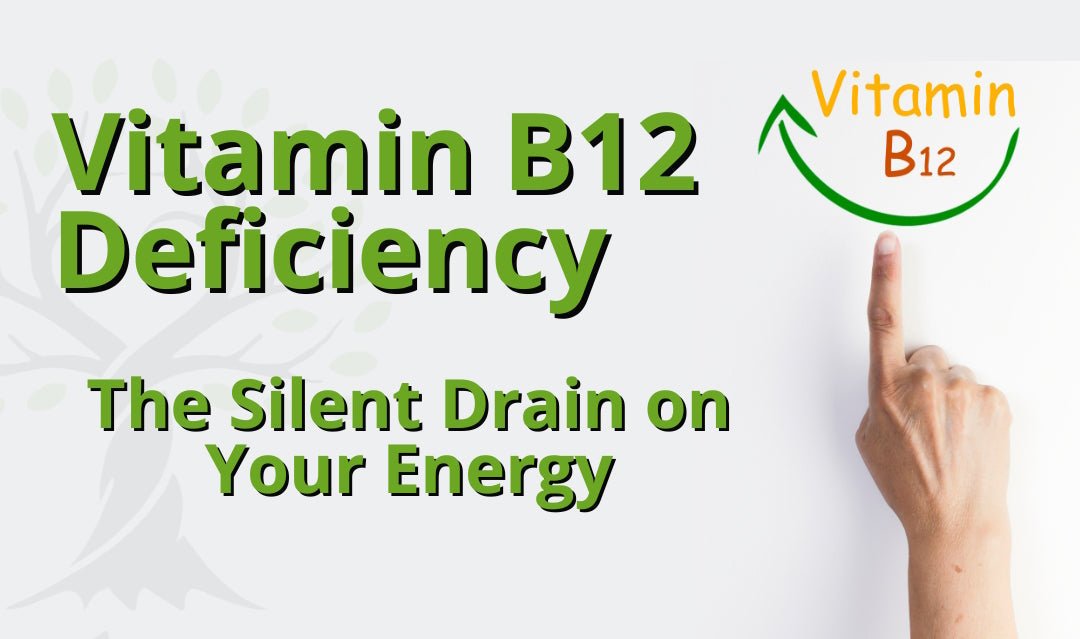Vitamin B12 Deficiency: The Silent Drain on Your Energy

In our fast-paced world, fatigue seems to be an almost accepted norm. However, when that tiredness evolves into chronic exhaustion, it could signify an underlying issue. One of the lesser-known culprits is vitamin B12 deficiency—a condition that slowly drains your energy without you even realizing it. This article aims to shed light on the significance of vitamin B12, its role in energy production, and how its deficiency might be silently impacting your vitality.
Understanding Vitamin B12
Vitamin B12, also known as cobalamin, is a crucial water-soluble vitamin that plays a vital role in red blood cell formation, neurological function, and DNA synthesis. Unlike some other vitamins, B12 is only found in animal-derived foods, which is why vegans, vegetarians, and others with restrictive diets are at a higher risk of deficiency. The body's inability to absorb B12 can also lead to a deficiency, which then leads to a cascade of health issues, particularly regarding energy levels.
The Role of B12 in Energy Production
Energy production within the body is a complex process primarily occurring at the cellular level. B12 is essential for converting the food we eat into glucose—a form of sugar that acts as a fuel for our bodies. Without adequate B12, this process is disrupted, resulting in decreased energy production and a subsequent feeling of fatigue. Furthermore, B12 supports the healthy functioning of the nervous system, and its deficiency can lead to neurological issues, further exacerbating fatigue.
Symptoms of Vitamin B12 Deficiency
Because vitamin B12 affects several bodily functions, its deficiency can manifest in various symptoms. Common signs include:
-
Persistent fatigue and weakness
-
Dizziness or lightheadedness
-
Heart palpitations and shortness of breath
-
Pale or jaundiced skin
-
Glossitis and mouth ulcers
-
Pins and needles sensation
-
Mood changes such as depression or irritability
-
Cognitive disturbances, including memory loss
Given that these symptoms are often attributed to other health conditions or lifestyle factors, vitamin B12 deficiency can easily go unnoticed.
Identifying Those at Risk
Vitamin B12 deficiency can affect anyone, but some are more susceptible than others. At-risk groups include:
-
Older adults: Reduced stomach acid production, which affects B12 absorption, becomes more common with age.
-
Vegans and vegetarians: Since B12 is found primarily in animal products, those on plant-based diets can miss out unless they use fortified foods or supplements.
-
Individuals with gastrointestinal disorders: Conditions like celiac disease or Crohn's disease can affect nutrient absorption.
-
People who have had gastrointestinal surgery: Surgical interventions, such as weight loss surgery, can impede B12 absorption.
-
Those taking certain medications: Some drugs, including metformin and proton pump inhibitors, can interfere with B12 absorption.
Diagnosis and Treatment
If you suspect a vitamin B12 deficiency, consulting with a healthcare provider is crucial. Diagnosis generally involves blood tests to measure B12 levels. If confirmed, treatment options might include dietary changes, oral supplements, or B12 injections, depending on the severity.
Boosting Your B12 Intake
For those vulnerable to deficiency, proactive strategies can help maintain optimal B12 levels. Incorporate B12-rich foods such as eggs, dairy products, meat, fish, and fortified cereals into your diet. If you're on a restrictive diet or unable to consume these foods, consider B12 supplements or fortified plant-based alternatives like almond milk or soy products.
Conclusion
Vitamin B12 deficiency may be a silent drain on your energy, but it doesn't have to be enduring. By recognizing the symptoms, understanding your risk factors, and taking steps to ensure adequate intake, you can reclaim your energy and well-being. Remember, prolonged fatigue is not merely a lifestyle inconvenience—it's your body's way of signaling that it may be time to address an underlying issue.
A balanced diet is essential for maintaining overall health and well-being. For those on a vegan diet, it's particularly important to ensure adequate intake of essential nutrients, as the risk of certain vitamin deficiencies can be higher. One critical nutrient is Vitamin B12, whose levels need to be carefully monitored in vegan diets, as this vitamin is primarily found in animal products. A deficiency in Vitamin B12 can lead to neurological symptoms, digestive symptoms, and even megaloblastic anemia, a condition characterized by the production of abnormally large red blood cells.
People with autoimmune diseases or conditions like chronic fatigue syndrome may also experience deficiencies that exacerbate feelings of fatigue and lead to further complications if not addressed. It is essential to maintain adequate levels of vitamins, including Vitamin B6, folic acid, and Vitamin D, which support various bodily functions, including blood cell production and hormone regulation. A deficiency in these vitamins might contribute to cognitive decline, adrenal fatigue, and lack of energy, further aggravating chronic diseases or autoimmune conditions.
For everyone, but particularly deficient patients or those with genetic conditions, a diet rich in essential nutrients like leafy greens, nuts, seeds, and fortified foods can help maintain optimal blood sugar levels and support food into fuel conversion efficiently. Furthermore, elderly patients should pay careful attention to their vitamin intake, especially to prevent Vitamin B deficiencies that might cause memory issues or exacerbate neurological symptoms.
Adequate sleep is another crucial factor in maintaining a healthy lifestyle. Lack of sleep or poor sleep patterns can lead to chronic fatigue, disrupting hormonal balance and heart health, potentially increasing the risk of heart attacks. On the other hand, getting the recommended hours of sleep and improving sleep quality can significantly alleviate lack of motivation and feelings of fatigue, leading to better mental clarity and overall health.
Addressing these medical conditions through a balanced diet and healthy lifestyle choices can prevent chronic and deficiency diseases from escalating. Foods rich in essential vitamins and minerals can help improve nutritional status, whereas taking steps to enhance sleep quality and duration can refine the body's repair and hormonal processes during rest. This holistic approach to diet and healthcare not only aids in the management of existing conditions but also plays a preventative role, supporting a robust immune system and optimizing physical and mental performance as we age.




